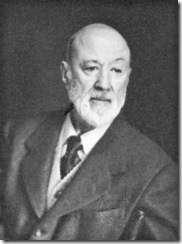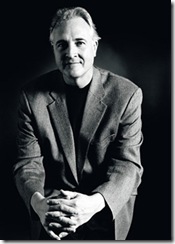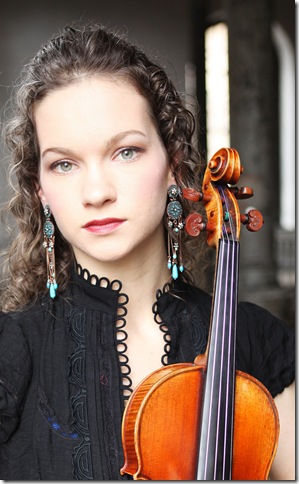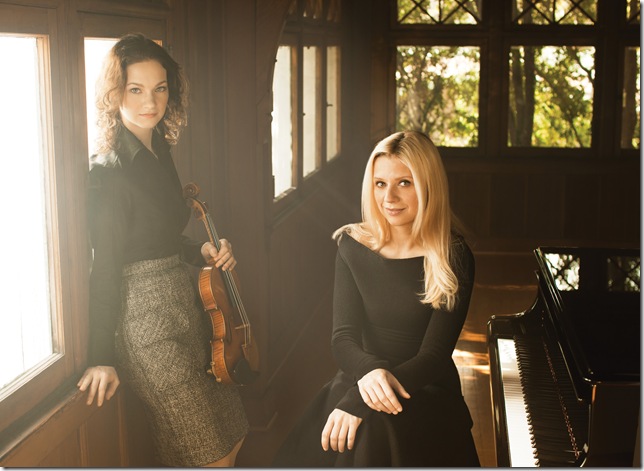She signed her first record contract with Sony at age 16, and her career has only climbed steadily into the empyrean of classical music stardom since then.
But it is a mark of the unpretentious, hardworking, homemade character of the professional life Hilary Hahn has built that while she could easily pull back and let the machinery of big fame bring gift-wrapped opportunity to her door, she’d rather pursue the things that interest her and take care of them herself.
And that’s why the Grammy-winning violinist was cold-calling Kryzsztof Penderecki a while back, asking the great Polish composer to write a short encore piece for her.
“With Penderecki, I didn’t know if he’d be interested or not. You never know, because with cold calling, you don’t know the person, so you can’t test the waters first,” said Hahn, who plays a recital this coming Sunday night in Fort Lauderdale. “Penderecki I called in German, and that was difficult because I was pitching the project, trying to explain it, in my second language, to someone in their second language.”
But Penderecki agreed, and while he hasn’t submitted the piece yet to Hahn, she’s programming it for the 2012-13 concert season. The new work will take its place among 26 others written by composers ranging from major established writers such as David Del Tredici and Einojuhani Rautavaara to up-and-comers like the young Nico Muhly, in a project called In 27 Pieces: the Hilary Hahn Encores.
Some of those encores will be heard at the Broward Center for the Performing Arts on Sunday evening, when Hahn takes the stage with Valentina Lisitsa, the fine Ukrainian-born pianist who is a familiar face in South Florida’s concert halls. Hahn will play the Sonata No. 3 in G minor (BWV 1001) of J.S. Bach, the Beethoven Sonata No. 2 (In A, Op. 12, No. 2), and the Sonatensatz of Johannes Brahms, the scherzo movement he wrote in 1853 for a collaborative sonata with Robert Schumann and Albert Dietrich.
Hahn’s recital comes two weeks after the release of her 15th album, a disc devoted to the four violin sonatas of Charles Ives, which she plays with Lisitsa. It’s a bold choice, and well in keeping with Hahn’s remarkable discography, and her life in general.
Hahn began playing just before her fourth birthday in a Suzuki class in her hometown of Baltimore, and by 10 was a student at Philadelphia’s prestigious Curtis Institute. Her first disc was devoted to the solo music of Bach, a most unusual move for a violinist just starting a big career. Her other efforts, first on Sony and now on Deutsche Grammophon, include a thrilling account of the Schoenberg Violin Concerto, new concertos by Jennifer Higdon and Edgar Meyer, the Serenade of Leonard Bernstein, Mozart violin sonatas, and concerti by Barber, Beethoven, Stravinsky, Shostakovich, Elgar, Sibelius, Paganini, and even the now-forgotten Ludwig Spohr.
She’s played on James Newton Howard’s soundtrack for M. Night Shyamalan’s thriller The Village, and for records by folkie Tom Brosseau and Austin rockers And You Will Know Us by the Trail of Dead. She’s picked up two Grammy awards and a sheaf of European recording prizes, and in 2001 was named America’s Best Classical Musician by Time magazine.
The Ives sonatas, written over a period from 1902 to 1916 by the maverick American composer, weren’t familiar to Hahn until recently.
“Those four sonatas are really unusual, and I had not heard them myself until I was looking around for music to add to recital repertoire, and I realized that I had never played anything by Ives. And he’s one of those prominent composers who is so incredibly influential, you don’t even really realize how much until you start working on their music,” she said.
It was the Third Sonata, a beautiful, reflective, deeply serious work finished in 1914, that first caught Hahn’s ear.
“I liked the Third Sonata immediately. I liked the others as well, but as far as which one I wanted to program for my next recital, I was drawn to the Third,” Hahn said. “And I really liked playing that one, so we programmed the rest of them in the next recital series.”
“Playing these pieces has been just fantastic,” she said. “When a group of people is hearing something that they’re not extremely familiar with, it doesn’t matter when it’s from; you get this really interesting feedback.”
 While Ives’s aesthetic is famously one of reference to the activities and sounds of small-town New England in the period just after the Civil War, for Hahn, interpreting Ives is less about knowing what hymn tune he was referencing than it is about making the pieces work.
While Ives’s aesthetic is famously one of reference to the activities and sounds of small-town New England in the period just after the Civil War, for Hahn, interpreting Ives is less about knowing what hymn tune he was referencing than it is about making the pieces work.
“There’s a lot of research you can do, but in the end, it’s about bringing the music across to the audience,” she said. “It’s fun to pick things out of the music and focus on ‘where did this come from,’ and ‘what is the history of that,’ but in the end it has to come across as integral music, and not just bits and pieces of things.
“And for me with Ives, that is a big challenge. There is so much going on at any one time. The music is complex, but it’s also meaningful, so that you can pick out different meanings each day that you play it.”
Hahn said Ives’s writing for the violin is not that difficult, but that the piano part is incredibly so, and marrying the two is what proved to be the biggest challenge.
“Putting it together is harder than the actual violin parts,” she said. “The violin parts are pretty playable. There are some tricky sections, but for the most part it’s not that impossible.
“With all of the rhythms needing to line up the way they need to in order for the music to make sense, first you have to kind of go through it and figure out what goes where, and then you can get into the music itself,” she said. “So it was figuring out that what-goes-where that was new to me.”
The idea for the encores, too, came out of a process of discovery and pursuing the idea to its logical conclusion. Hahn, who turns 32 in late November, said it began about 10 years ago, when the violinist became aware of how many collections of encores had been published and recorded, and how many of them contained the same “golden oldies.”
“I just figured ‘Well, that’s interesting, but I wonder where the new ones are?’” she said.
Thus was born the encores project, and Hahn soon realized she’d have to be the one to get it off the ground.
“It’s such a big project that it’s impossible for anyone else to take the initiative besides the person who really, really wants to see it happen,” she said, and once she figured out where to start, she engrossed herself in it. “I dove into it on my own initiative, and that made it a very personal project and a lot of fun, actually.”
And it generated a large number of responses, which Hahn cut off at 27 “because I got carried away and I had to stop somewhere,” she said, adding that she didn’t realize at first how many composers would agree to take part in the project.
One of the composers is Paul Moravec, 53, who won a Pulitzer Prize in 2004 for his Tempest Fantasy for piano, violin, cello and clarinet. He said he was at the Santa Fe Opera in 2009 for the premiere of his first opera, The Letter, when Hahn called him and asked him to participate.
“I was delighted that she thought of me,” Moravec said, who added that he and Hahn have not yet met, though he was aware of her work through her recordings, “which are fantastic.”
 Moravec’s piece, Blue Fiddle, will be played Sunday night. He said it’s about 4 minutes long, and according to his program note, was designed to reflect “the wide range of Ms. Hahn’s astonishing technical and artistic mastery.”
Moravec’s piece, Blue Fiddle, will be played Sunday night. He said it’s about 4 minutes long, and according to his program note, was designed to reflect “the wide range of Ms. Hahn’s astonishing technical and artistic mastery.”
“The principal challenge is to be as comprehensive as possible in a short piece, to use that time wisely and put a lot of material into it, which is what I did in this piece,” Moravec said. “There’s a lot going on in a short duration … There’s a lyrical vibe to it, and there’s also a fast, virtuosic vibe as well.”
Moravec said he and Hahn have communicated about tempos and other details, but he’s not yet heard the piece, and Sunday night’s audience will hear it before its composer does.
“For me, the word ‘encore’ suggests a sort of lightness, an ‘l-i-t-e’ kind of thing, a bon-bon, a dessert,” Moravec said. “Personally, I’m not interested in that. What I wanted was something that entertains, but which is also substantive … That’s what I tried to do in this piece. I tried to make it musically interesting, musically substantive, and not just a showpiece.”
A total of 26 composers have written or are writing the encores, but for the 27th, Hahn has planned something unusual. Last week, she announced that the last encore will be chosen from an online contest open to anyone in the world who wants to write it. She’s opened the contest online (at www.hilaryhahncontest.com), and will accept submissions from Nov. 15 through March 15.
She’ll play the piece she likes best of all the entries in her recital programs in 2012-13, and record it for release in 2013-14. Each submission will generate a $2 donation to Dramatic Need, a British charity that brings arts programs to poor rural communities in South Africa and Rwanda.
Hahn, who writes regular journal entries at her website, www.hilaryhahn.com, and Tweets in the persona of her violin case (@violincase), also conducts regular interviews of composers for Sequenza 21, the contemporary classical music web portal. Although she didn’t know much about computer technology when Sony first built her a website, she has taken it to heart and made it her own, and says she could not have done the encores project without it.
“I just sort of did it all online,” she said.
Technology’s ability to break down old cultural barriers also has led to a broader audience for her concerts, another development that Hahn applauds.
“I do see quite a variety of people in the hall, and every concert that I can remember there’s been someone for whom it was a new experience to go to a concert,” she said, shortly before hanging up to get to the airport for the next stop on her tour. “And there’s always some veteran concertgoers who come up and tell me stories.”
In other words, like with the encores and the sonatas of Charles Ives, plenty of different things going on.
“I like that variety,” she said.
Hilary Hahn and Valentina Lisitsa will perform at 7 p.m. Sunday, Nov. 6, in the Au-Rene Theater at the Broward Center for the Performing Arts, Fort Lauderdale. Tickets range from $15-$55. Call 954-462-0222 or visit www.browardcenter.org.

